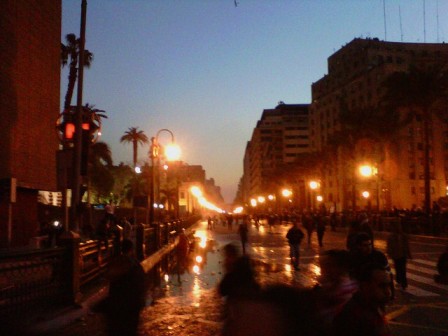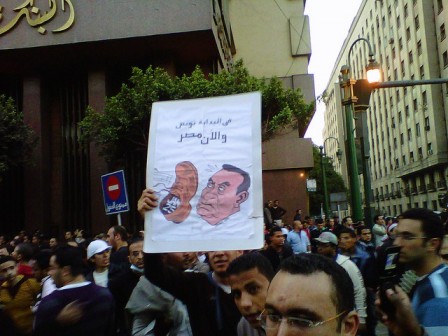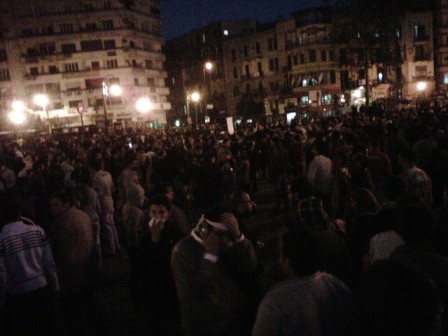Arab Revolution: Israel Should Compromise While It Still Can

NEWS JUNKIE POST
Jan 27, 2011 at 11:31 amEgypt has entered a 3rd day of historic and violent protest. Inspired by the Jasmine revolution in Tunisia, thousands of Egyptian protesters have confronted the police in violent clashes in defiance of a ban on public demonstration. Just like Ben Ali in Tunisia, Mubarak has ruled Egypt with an iron-fist and a taste for corruption for 30 years. The Egyptian police is using brutal force against the demonstrators such as batons, tear gas, water canon and are firing on the crowd with rubber bullets. At least a 1,000 people have been arrested, and four people are confirmed dead.
Egyptians are asking for the resignation of Mubarak, and are requesting major structural changes. The Egyptian people want a non-corrupt government which goal would not be ruling to exploit the people. 40 percent of Egyptians are living below the poverty level which is defined at a meager two dollars a day. Egyptians, just like their Tunisian brothers, are fighting for social justice and freedom in what is a secular social movement.
Despite the crackdown by Mubarak security apparatus, Egyptian activists are planning an even bigger protest for Friday in what seems to be an unstoppable momentum to oust Mubarak. Adding to this, an opposition political figure, Mohamed ElBaradei returned to the country on Thursday. ElBaradei, the former head of UN nuclear watchdog and Nobel prize winner, called on Mubarak to quit and said he was ready to lead the transition. ElBaradei has the international clout to do so.
“He has served the country for 30 years and it is about time for him to retire. Friday is going to be a major demonstration all over Egypt, and I will be there with them,” said ElBaradei.
Beside Egypt and Tunisia, thousands were marching in Yemen on Thursday to ask for the resignation of the government. This is a tectonic geopolitical change taking place in the Middle-East, and the United States, the UN and the EU are scrambling to figure out what to say. The US State Department called for both parties to use restrain, and UN Secretary General Ban Ki-moon called on the Egyptian government “to respond to the legitimate concerns of its people who have staged protests”. “We urge Egyptian authorities not to prevent peaceful protests or block communications including on social media sites,” said the US State Department.
This of course is hypocrite, on the part of the United States, considering that the US policy in the region has been to support autocrats -such as Mubarak, Ben Ali and the Saudis- for decades while pretending to preach the gospel of “freedom and democracy”. It is more a question of when than if Mubarak will be toppled, and when this happen it will be a game changer for Israel. With the Arab Revolution spreading fast, Palestinians, both in Gaza and in the West Bank, will have the full support of their potentially united Arab brothers, while Israel is becoming more politically isolated. It is time for Israel to make concessions or to face the consequences.
Editor’s Note: All photographs by Muhammad Ghafari.
Related Articles
- March 19, 2010 Middle-East Quartet Wants Israel To Freeze Settlements
- January 30, 2011 Arab People: From Powerless To Proud
- February 16, 2011 US Foreign And Budget Policies: Putting Bandages On The Titanic
- January 31, 2011 Toppling Of Mubarak: A Chance For Peace In The Middle East
- January 16, 2011 Tunisia’s Jasmine Revolution: Spreading Fear Among Arab Dictators
- February 6, 2011 Will The Secular Arab Revolution’s Domino Effect Reach Iran?

















4 Responses to Arab Revolution: Israel Should Compromise While It Still Can
You must be logged in to post a comment Login